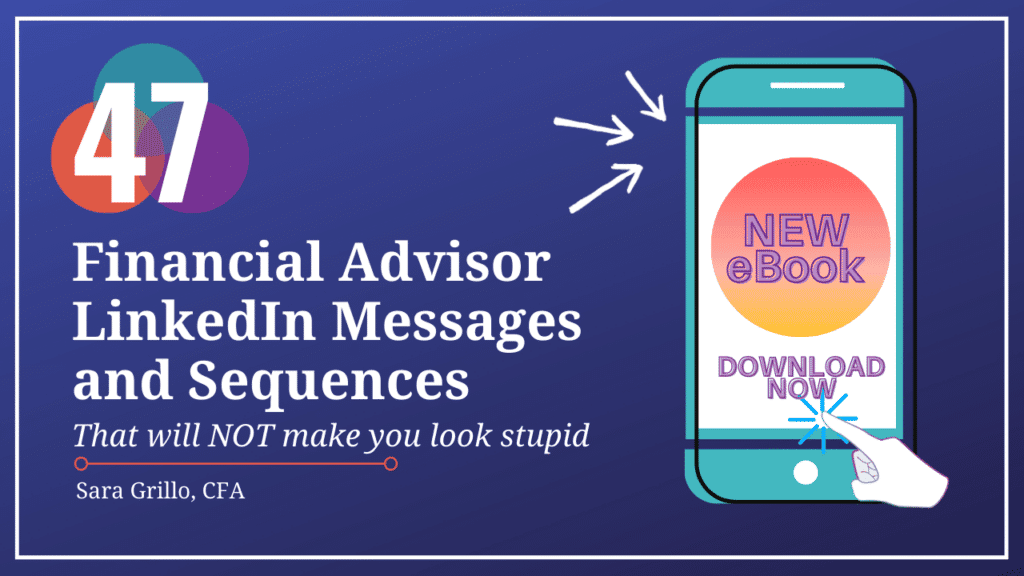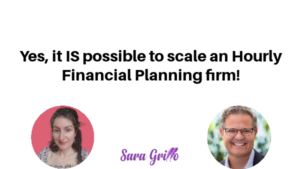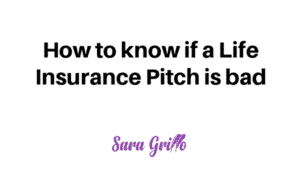Podcast: Play in new window | Download
Financial advisor sales questions are typically very pressuring and make the person asking them look like a sleazebag. Learn a more human and emphatic way to communicate in this podcast. I interview financial advisor sales coach Dan Solin about what financial advisor prospecting tips he has in store for us in his book called Ask: How to relate to anyone.
In this podcast, you’ll hear about:
- Sales tips about having empathy and listening to the prospect
- The neuroscience and psychology behind the positive results of asking good financial advisor sales questions
- How to handle it when someone feels your questions are annoying
- What the most important things are to do if you want to relate to wealth management prospects better
- The biggest misunderstanding we have about communicating with others in financial advisor sales
For those of you who are new to my blog/podcast, my name is Sara. I am a CFA® charterholder and financial advisor marketing consultant. I have a weekly newsletter in which I talk about financial advisor lead generation topics which is best described as “fun and irreverent.” So please subscribe!

Financial advisor sales questions to avoid
Financial advisors always ask the wrong sales questions. There’s so much bad training and the pressure of the job can lead us to ask questions that are too demanding of someone who doesn’t really know or trust us. This erodes trust instead of building it up.
Remember that the most genuine way you can show appreciation for someone is to take a sincere interest in them. We are never as interested in other people as we are in having attention paid to us. If you keep asking someone questions about themselves, eventually they are going to view you favorably enough to open up and ask a question back. Be patient.
Bad financial advisor sales question examples:
- What’s your net worth?
- What keeps you up at night?
- How much are you looking to invest?
For more, see this list of prospecting questions to avoid.
There’s no set list. As you’ll see from the podcast below, the best sales questions a wealth manager could ask are those that flow in line with the conversation, are reflective, and come as a natural consequence of intently listening to what the person said. To demonstrate this, here are examples of questions that are good for financial advisors to ask a prospect:
- How did you get from where you were as an MD in a hospital to where you are now?
- Could you tell me more about what you feel that way?
- And then what happened next?
- Tell me more.
- I’m listening.
- How would you like to proceed (at the end of the meeting)
Some of these aren’t actually questions but invitations for the person to speak more. And that should be the entire point of any sales question you ask someone as as financial advisor; to get them to talk more.
Podcast transcript
0:00:02.0 SARA GRILLO: He once of everybody say or back, and today I’ve got Dan Solin here. Hey, what’s up, Dan?
0:00:11.2 DAN SOLIN: Hello, Sarah, great to be with you. Thanks so much for having me.
0:00:27.6 SARA GRILLO: So tell me about your new book.
0:01:08.6 DAN SOLIN: The premise behind ask is that all of us are consumed with our own agenda in virtually every interaction, but if we want to establish deeper, more meaningful relationships with other people, we have to put our agenda aside and elicit from those people what their agenda is, and the only way we can do that is by asking questions.
0:01:37.0 SARA GRILLO: I think a lot of people get worried about putting someone else’s interest before their own in a conversation because they worry, Well, what if the person is just a taker, and then they don’t think much of me because they don’t really know me, how are they gonna get to know me and value me.
0:01:59.8 DAN SOLIN: So I do hear that a lot, it’s a very good question, and the answer to that question is this. First, if you just look at your own life and all the interactions you’ve had with other people, I doubt if you could count on one hand it would be less than one hand, the number of times somebody has shown a genuine interest in you as a person rather than trying to convey something to you, so when you follow the lessons and ask, you become one of those rare people who actually is genuinely and authentically interested in other people. Now, it is true that it’s so compelling from a neuroscience point of view to be talking about yourself that very often people report to me that the other person never asked a single question about them in response, and all I can say to that is when that happens, they will still have a feeling about you that is very special, that you are a person of great judgment, they like you a lot, they appreciate your company, they value you, if they are of course genuinely interested in you, nothing stops them from saying… So Sarah, tell me about yourself.
0:03:27.6 DAN SOLIN: But you do have to be prepared for it to be a one-sided conversation. And the question then becomes, what’s the goal? If the goal of deepening the relationship is a bigger, better goal than having a bilateral conversation where you each discuss whatever you wanna talk about, that’s a decision you have to make.
0:03:55.5 SARA GRILLO: It just seems like a lot of times in human relationships of every tight personal business, we don’t get to the point where we understand, we need to actually listen to the other person until we get to the point of conflict.
0:04:11.3 DAN SOLIN: That’s very sad and probably true, but most unfortunate, right. There’s no greater compliment you can give another person than showing a genuine interest in them, and it’s so rare that we do that, I have no end of stories where… People ask me what I do, I say I’m an author, ’cause I think that it sounds interesting. And the lack of curiosity of other people, like they wouldn’t even say to me, So what kind of books you… Right, because I’ll say I’m an author. What do you do? And then we’re off to talking about them, but I do that because I am an introvert and I don’t like talking about myself, and b, I really… I’m bored with myself, I find it interesting to learn about other people, and then when that happens, I get tremendous pleasure when I get that wonderful feedback that I get, which is, Oh, I so enjoyed talking to you. I hope we stay in touch. To me, it’s worth it. I’m not saying it’s worth it to everybody, but to me it’s worth
0:05:22.7 SARA GRILLO: Me, there’s no magic formula for any… And no one really has the answer here because it’s not a simple answer, but Dan, what you’ve done, the book that you’ve written is not only useful to financial advisors, it’s useful to society. Right. And I’m quoting here from your book:
The frequency of arguments and relationships is stunning. A study in the United Kingdom found the average British family had at least three disagreements a day, equating to 1095 arguments a year at lasting for more than 91 hours in total. Almost 10% of the participants reported they were not currently speaking to their partners due to a recent argument.
-Ask by Dan Solin
And that’s really interesting, that factoring there, Dan, because not many people will admit it, but it’s more common than we think that people just are either time to cool off or in an extended fight and a study, a survey done in the US, found American couples on average argued 19 times per month, resulting in one partner spending on average five and a half nights a month on the couch. Another thing people are not really willing to admit…
0:06:32.5 DAN SOLIN: Yes, the real point of all that is not that there’s so much conflict, but I was surprised for the same reasons you just mentioned, I was surprised to learn that there was so much conflict, but the real point of it is how do you best resolve that conflict and what I learned from my research is how to not try to resolve the conflict, which would be me trying to convince you that I’m right and you’re wrong, and me trying to do that by marshalling all the facts that support my position and show that you’re wrong, so one of the key lessons of ask is to shift your brain from trying to persuade people to trying to understand them, to instead of judging them, to be empathetic and understand their position and where they’re coming from, so if you and I are currently having a disagreement here, and I believe I’m right. A much more effective way to breach that gap would be for me to say, Sarah, could you explain more to me about why you feel that way, and just keep asking those kinds of questions and then follow it up with, after we continue that dialogue, say, would it make a difference to you.
0:07:54.2 DAN SOLIN: If I did this or if I change my position in this way, would that help reach the gap between us… So the power of asking questions to resolve conflict is one of the most surprising findings of my book.
0:08:11.0 SARA GRILLO: Was there a particular study that you conducted within your research that led you to that…
0:08:18.1 DAN SOLIN: There is one seminal study, a Harvard study, where they took 190 people participants, and I’m gonna give the Reader’s Digest version of the study, basically what they did is say, Go into a cubicle and just talk about yourself dictate into your smartphone, and they had them hooked up to function in our eyes, and they found that when they looked at the functional MRI, and this was a huge epiphany for me. The amount of pleasure we get from talking about ourselves is equivalent to the amount of pleasure we get from activities that everybody, almost everybody would regard as highly pleasure about… Whatever that is. Sex addictive drugs. Fine meals, fine wine. So when I read that, the only thing they did a follow-up study and they found that when you’re talking about yourself and you think other people are gonna be hearing it, then the preface of the brain lights up even more. And for those who are interested in the technical aspects of it, they theorize, it’s because two hormones, dopamine and oxytocin, which are both kind of feel-good hormones flood into the pre-front. So I looked at that research and I said, Okay, when I meet you, I have two choices, basically, I can try to be entertaining, engaging, witty and charming, in which case, you’re gonna feel largely diminished, and the longer I go on, the more diminished you’re gonna feel…
0:09:56.0 DAN SOLIN: And the hormones that are at play there are similar to ones that are released when we’re experiencing physical pain or high levels of stress, that’s the way the brain reacts when people are talking and we’re listening, or I can empower you to talk about yourself, and if I do that, I can convey chemically, an enormous amount of pleasure, which will be rare in your experience. So why wouldn’t I do the latter? That’s the way I came out. I think
0:10:31.0 SARA GRILLO: Another roadblock that people have run into, and I myself have run into this is, what if the person says, Why are you asking me so many questions…
0:10:42.2 DAN SOLIN: Yeah. Right, so that is a particularly good question, so not all questions are created equal, right? So the kinds of questions I’m talking about… First, this is not a parlor trick, it’s not a way to manipulate people. People are very sensitive to being manipulated, if you don’t have a genuine, authentic curiosity about people, you will not be successful implementing the research and asks the questions are questions that we all really… I wish we did have… And what asked does is kind of re-orient us to learning more about other people, but the genuine curiosity has to be there, so the kinds of questions… Like for advisors, when I’m talking to them, What’s your net worth? That’s a question. Right, but that’s not the kind of question I’m telling people to ask the kind of question upon meeting you is not what… Hi. What’s your net worth? It’s so, Sarah, how did you get from where you were as a MBA on Wall Street to where you are now?
0:11:57.8 SARA GRILLO: And also with children too, when you learned this with children, everyone who has parents probably can understand this, is that you have to put there… You have to put their agenda first, I’ve learned to do that, and sometimes I don’t always, but I become much more observing, not only of the words people say, But of their actions, I’ve found that their actions speak and their body language speaks.
0:12:48.9 DAN SOLIN: People like us were well educated, we have a lot to say, we have a lot of opinions, and we’re trained intuitively to believe that people are interested in what we have to say, and that’s our default, so when we meet people, we think, Oh, they’re probably interested in a lot of my views and opinions, but what the research shows, it’s quite the opposite, they’re not terribly interested in us at all, they’re interested in talking about themselves, just like the Harvard study. And our job is to empower them to do that. And it’s not hard, it’s easy to articulate. It’s not hard to do once you buy into it, because it’s just changing like an ingrained habit of, it’s all about me to…
0:14:17.4 DAN SOLIN: It’s really all about you. You’re interesting is, again, I don’t think I’m particularly interesting. I think other people to me are much more interesting, I didn’t find this a…
0:14:29.7 SARA GRILLO: And I have a lot to say about that, but let me just read a great quote from your book:
And I tell my clients to follow two basic conversational rules if they wanna fundamentally change their relationships, don’t end any sentence with a period, instead try and make every statement a question, this rule is easy to state, but challenging to implement because we are predisposed to convey information, you’ll need to retrain your brain to suppress that inclination. Number two, picture the forehead of the other person as emitting a light, light is green when they are talking and read when you were talking. The goal of every conversation is to keep the green line remit on for his long as possible, and after these rules and you are well on your way to better relationships.
-Ask by Dan Solin
0:15:15.8 DAN SOLIN: Yeah, the green light, red light works. I do think about that a lot. When I do webinars or podcasts, I have a conflict because I really don’t… I know the longer I talk, the more distracted people are gonna be… Humans have a very short attention span. So when people are giving talks and presentations, what they don’t understand is after relatively few minutes, the retention level in the room, no matter how great a Speaker you are, goes to pretty much zero, so unless you can be interactive, you’re in trouble, but a webinar is by nature and a podcast is, Oh, people are asking me questions. I’m gonna talk so I try hard to keep my answers really short…
0:19:10.3 DAN SOLIN: Instead of being spontaneous and reactive, your plan is to elicit information you and then keep eliciting it in a nice non-threatening way, and that puts you in total control of all situations, for introverts in particular, we’re not happy in most social situations, they create anxiety for us, but once I started doing this, it just…
0:21:02.5 DAN SOLIN: I look forward to all social situations ’cause I just gave me an opportunity to learn more about more people, look what I’ve learned from you just in this podcast, right. That story is really interesting, and it validates really well, the underlying research and ask.
0:21:21.8 SARA GRILLO: But it’s also… I think it takes away a lot of the anxiety about interactions when you’re willing to let the other person leave, ’cause you’re gonna give them control…
0:21:36.3 DAN SOLIN: Yes, well, you’re gonna empower them to talk… You’re in control. And that’s the part that I really like, like, you know how awkward it is at a party, it’s a large party, you meet someone, you have these short sound bite conversations, they all seem awkward and uncomfortable to me at least, and I think to many other people, so now you’re in charge of this. It’s like, so Sarah, what do you do? How did you started doing that, and it’s so natural when you start and train yourself that it reduces… It does two things, it reduces anxiety to practically zero in all situations, and it… So enhances your relationship. I should send you emails I get… After I go, I don’t go that many parties, especially now, we don’t go to any, but before the covid, we would go to some, but I don’t like them, so we typically wouldn’t, but all I would do is ask whoever is talking about… Just ask some questions and I get the most touching emails afterwards, like, Dan, I can’t tell you how much I enjoyed meeting you and we had such a wonderful conversation when we didn’t… There was no bilateral conversation, it was just me learning more about them, but
0:22:58.5 SARA GRILLO: I know that you are reflecting to them… Yes.
0:23:01.9 DAN SOLIN: Good, good way to put it
0:23:03.8 SARA GRILLO: Right there in. And I actually just found out, I was looking at this email here from the therapist is actually as imitates. Yeah, So imitate.
0:23:17.4 DAN SOLIN: I do cite some studies on that in fasting called mirror neurons, and without going into… It’s a famous Italian study with monkeys, but basically, if you want people to feel better about you when you’re meeting them, you imitate their gestures and movements and the way they hold their head, and people love that for some reason, that sets out something in their brain, you do that, and then there are one other thing you can do, Sarah, which is used their name from time to time as I just did, and go back to where your brain went when I just did that… Right, so using a name in an appropriate number of times and asking questions if you combine those two, you’re well on your way to establishing a wonderful relationship, whether it’s business or personal…
0:24:09.6 SARA GRILLO: I think where it falls down for a lot of people in this whole thing is getting the right questions to ask, so this is again from your book, you may think asking questions would be simple, it is another… Is the hard way. Here are the typical questions they asked what are your specific retirement goals, what keeps you up at night, if I ever heard about, how much money do you have to invest? This is like such a destructive, negative, controlling, like prying question that What are your yearly expenses… These are questions, but they aren’t the right ones, let’s assume you’re going out on a first date, you meet for dinner, you immediately ask the person these questions, when in a relationship, do you think is appropriate to meet other family members… How so are you interested in getting married if you meet the right person, how do you feel about having children… These are also questions, but they are present, she was an off-putting… So what Dan should be the types of questions that you could ask because… And that’s one thing actually in my therapy with my sign, is that the therapist said you can’t ask a question because the question is, can be very controlled, Oh, why are you putting the red block on top of the globe that could be interpreted like you shouldn’t…
0:25:25.2 SARA GRILLO: Putting the red block on top of the blue block… You know what I’m saying? So that’s another thing that the therapist said, So what is… In a financial advisor situation, you do have to ask some of these questions, and that is… Then when I talk about your work with my clients, a lot of times they say, Well, you know, I like this with the sole method. Did I mess it up? Is it the solid method is that… The sole process, right? I discussed the Olin process, and my clients say to me, But Sarah, how do I go to that first meeting and not have to be a complete waste of time, because I’m talking to someone with 3 to their name. So how do you do that demo, do you get the questions in to make sure that you’re not wasting everyone’s time…
0:26:10.1 DAN SOLIN: Okay, so there’s a lot in there. First, I don’t understand why you’re ever in a situation where you might be wasting time… Most advisors put their minimums and their ideal client… And all that information on their website. So I would think that in the initial call, you could just say, were you able to spend some time on my website and that would be adequate screening… Because you lay all that out. So now what happens is you get to the meeting and advisors tend to think what’s going to happen is… And has happened, by the way, in a small percentage of cases, we’re just gonna talk about sports or fly fishing or something, the hour is gonna go by, I’ll never have a chance to make my pitch… That has happened. When that happens, what I say to them when they call me is, I give you about a 95% chance of landing that business, and almost always, I’m right. But people are not stupid. They know why they’re there. If you have the patients to ask questions and wait for them to ask you a question, you mentioned an autistic child, so I’ll just tell you that a star is a perfect example.
0:27:25.1 DAN SOLIN: Advisor told me that he was meeting with clients and he talked 50 minutes, I was before he read my work, and then he said, Well, our time is kind of winding down. Do you have any questions? Which is, of course, the exact opposite of what I recommend. And the wife, timely said, turned to her husband and said, You know, we wanted to talk to him about a special needs trust for our child, but I don’t think we have enough time. And because he didn’t ask questions or show any interest in them as people… He didn’t understand that that was the whole reason why they were there. Most people, if you ask them enough questions in a nice non-threatening way, again, sooner or later, they’re going to ask you a question and then instead of assuming you know what they wanna talk about, now you really know what they wanna talk about. Do you coordinate with my estate planning attorney when you hear that… Okay, now you answer that question, it’s not like the whole meeting is you can’t make a statement that doesn’t end in a period, the exception to that rule is you can…
0:28:38.4 DAN SOLIN: When you’re asked a question, give that answer, and then you turn it around with another question, did I answer your question, but would you like more information and at the end of that one hour meeting, you look at them and say, How would you like to proceed? That’s a question. I can tell you that I’ve trained hundreds, maybe thousands of advisors in my process, and almost always, if they’re going to close, they close in one or two meetings, I can’t recall anybody where it’s taken three meetings, it’s actually a much more efficient process than the way they currently are doing it. We don’t, by the way, hire people because of what’s called cognitive trust, which means we hire the best qualified people…
0:29:28.2 SARA GRILLO: No, because that would be a decision based on logic, you make decisions based on logic.
0:29:33.8 DAN SOLIN: We make decisions based on emotion, and the emotion we’re thinking about is, do I like you? If I like you, I trust you. If I like and trust you, I’m going to hire you. And then very often, clients will say to me… At the end of the hour, I’ll say, How would you like to proceed? They’ll say, How do we get started? And at the very beginning, when I was doing coaching one, I still remember this one client said to me… I looked at him and said, Well, don’t you even wanna know how I’m gonna invest your money? And the prospect said, Well, if you insist, go ahead. And then they started down the rabbit hole because everybody can pick trouble with… Oh, I don’t believe in that. I don’t… When you trust someone called Effective trust, meaning the con of trust you have with your dentist, maybe your car mechanic, you don’t say to your dentist, why are you using that size drill? You know that he has your cognitive trust, that he went to dental school and is properly trained, and then you totally trust him to put a sharp instrument in your mouth, and that’s the goal on what ask does is get you faster to effective Trust, which is real meaningful trust.
0:30:54.5 SARA GRILLO: Right. Well, they make the decision to trust you based on emotion, and then the trust becomes solidified, there does need to be some of that logic stuff in there too, because then they justify it with logic. Yes, well, I like them or I like her, and I noticed that she was a CFP, and I also liked that she had five people working for her, it all kind of… Yeah, I think at the core of this is the question of what is the value of a financial advisor services, and this is just so that could be a topic for another podcast, but a lot of advisors, it starts with their self-image and how many perceive themselves and a lot of them are still in this game of, I get the best performance, so that’s why you should invest with me, there was… Our cases, when I’ve tried to work with people for years and years, and well, is there something more than that, because there still is this old, maybe old school mindset of the advisor is a stock broker.
0:32:11.2 DAN SOLIN: So I’m fascinated by the insecurity of advisors who are always talking about, how do I establish my value and voice my value proposition? And one of the things I say to them is, you have a lot of other professionals in your life, do they ever talk about or feel the need to establish their value, like your accountant, your doctor, your dentist, they’re not always saying to you, let me tell you why, what I’m doing has value. When you get too effective trust, people trust that you have value, if you really have to explain why you’re adding value, you probably aren’t…
0:32:52.2 SARA GRILLO: It might not be that you aren’t necessarily in people, it just be that in their eyes, you want… In a healthy relationship, your value should be apparent
0:33:05.2 DAN SOLIN: The same way it is with other professionals, their value is apparent…
0:33:10.9 SARA GRILLO: Well, yeah, but I think it goes back to when most of the time, when an advisor is in growth mode, a lot of times they go into a meeting with the mindset of, Well, I wanna close this account, and I’ve heard from a lot of advisors who aren’t necessarily in at very hungry kind of stage of they could take it or leave it, and I’m okay with it, and I’ll say that to the person and not not in so many words, but I’ll show them through the conversation, if I find out that they’re looking for performance, and I’m not a performance-oriented type of person, then I’ll just suggest, Look, you might want another advisor that is gonna operate their practice a certain way and emphasize the performance, but me, I emphasize planning and the relationship and blah blah… And they say that as soon as they say that, as soon as they detach and they take the deal off the table, the person almost immediately… It’s like, No, but I do wanna work with you. Just because they kind of did that.
0:34:15.2 DAN SOLIN: So let’s look at what’s going on in that scenario, right? The data is really very clear that humans are particularly sensitive to being sold anything, and when we think we’re being sold or someone’s trying to persuade us to buy something or to take an action, what happens is cortisol measured in the saliva, blood goes up, cortisol being the stress hormone fascinating study. They took two groups of people, gave them the same script to solicit charitable contributions from people who had been known to make similar donations in the past, they said to one group that was soliciting all being done on the phone, we’re gonna pay you an hourly rate. So it doesn’t matter what your results are, you’re gonna get the same hourly rate, they said to another group, you’re gonna get a percentage of what you raise consistently time after time. The group that was being paid hourly was more successful in generating larger contributions than the group that had an interest, because the tone of their voice or something about the way they were coming across conveyed that they were in sales mode. So one thing we know, and it’s just almost a fatal misunderstanding of all of us, but particularly advisers, is we think that trying to persuade someone that we’re the right firm, that we have the expertise and background is a good idea.
0:35:54.8 DAN SOLIN: And it’s totally counter-productive. So one of my rules is, you can’t persuade whenever you’re thinking of persuading stop, it’s counter-productive. You can’t persuade.
0:36:17.0 SARA GRILLO: So to answer the question that I think a lot of advisors listening to this podcast are gonna have… What about the elevator pitch? What about the value proposition, Dam? If I can’t persuade, this is decades long of the sales trainers of… I put this out there, millions of millions of dollars have been paid to teach these skills, what about
0:36:39.1 DAN SOLIN: Those people… When they ask those questions, they’re tinged with emotion because they feel that’s what they should be doing. It’s kind of an emotional feeling. I’m just guided by the research, what the research tells me is whenever you try to do that, you actually draw people farther apart, now, for example, interesting study you’ll find interesting as a mother, there’s a whole group of people who are opposed to vaccinating their children, and they have very strong beliefs about not vaccinating their children, but the overwhelming medical evidence is that vaccinations, the standard vaccinations do not cause harmful effects. Let’s just take that as a given. What they find is, when you explain to people all the reason we explain to mothers all the reasons why their children should be vaccinated, you polarize them even more, they are less likely to agree with you and to have their child vaccinated. So I can’t find any support for the elevator pitch for any pitch at all, all I find is it drives people apart. I have calls virtually every day with prospective new clients, I never pitch anything, I simply respond to their questions, and then I ask them more questions.
0:38:06.7 DAN SOLIN: I know, I need to understand that more. What are you trying to accomplish? Tell me more of what you’re really looking for. Do you have any questions? And that’s it. And we hang up. My conversion rate is very high. I eat my own cooking.
0:38:28.6 SARA GRILLO: Can you talk about the Ask Pivot?
0:38:32.5 DAN SOLIN: Yeah, the Ask Pivot demonstrates the enormous power of how much people enjoy talking about themselves, so you could… If you and I met, and given the example I reference early and you said, Dan, what do you do? I could say I’m an author, if I just stop there, you probably would say what kind of books you write, but they ask pivot, ’cause I wanna get you talking about yourself, the… Ask Pivot is, I say I’m an author, and then I pivot by saying, What do you do, Sarah? That’s the pivot. My goal is to have you talking… I don’t wanna talk about my books in my life, I wanted to hear about you so that… The pivot is a very effective way. However, I’ll tell you as a funny story, just happened this morning with my wife and I were talking… When we got up, we were having a coffee and she said to me, So how did you sleep last night. Now, keep in mind, I’ve been steeped in this research for years, I really understand the data, I know how people are gonna react to whatever I say, But I happened to have slept really well last night, so I said, You know, I really stepped really well last night, and then I went into more detail of when I got off on…
0:39:50.9 DAN SOLIN: And I didn’t even think to say to her, How did you sleep last night? That’s what happens when we talk about ourselves. We get so caught up in it that we forget about the other person, even when you’re trained…
0:40:08.3 SARA GRILLO: Yeah, well, different things too, like emotions and stress and pressure canal at the filter can kinda go out the window. Definitely, I actually came up with my two-sentence rule a while ago, and it was because I would… Because I have so many kids, I found myself getting into the negotiations with them or… I just found that when I communicated in two sentences like Eh… Of breakfast right now. If not, then you’re not going to the park. When I just started to limit my conversations to two sentences with them that it was awesome, and then I started doing it in emails I was sending… I hardly ever now send paragraph after paragraph, even like a three-sentence email, if you notice what I communicate, everything is like two sentences or less… A lot of times, most of the time, right. And I’ve actually found that this has worked so beautifully, and I think it’s also a product of communicating a lot of times over Instant Messenger, because a lot of my membership from Instant Messenger and just a lot of my prospecting is done that way, and so it’s the idea of being a little bit more organized, what your thoughts and keeping it concise, but also allowing the person to breathe, I think…
0:41:26.1 SARA GRILLO: I think kinda like we’re both saying the same thing is advisors are like, listen to Dan and listen to me, and just take a minute to allow the other person to be and to breathe in, to express themselves into control and let them read… It doesn’t mean you’re not being a leader, that you’re not gonna get to work with them, but just you gotta let them lead ’cause where they go, they’ll feel better because they’ll trust you, coming along with them, that’s how you build the trust, I feel as you being willing to go along with them.
0:41:59.5 DAN SOLIN: So two things with that story, one is… My expression is always: go second. We’re always thinking of, Oh, I’m meeting you, I have to go first. I have a lot to save to go first, and so train yourself to always go second and second the breakfast story, two sentences are good, but even better is, Do you want apple sauce or corn flax for breakfast? That’s a question. Whenever you… A question from a statement, you can… I can almost envision what’s happening to the brain of the person I’m talking to, and it’s science, it’s neuroscience and psychology, supported by hundreds of… So I think that I can’t recall, but I think the bibliography in my book is 60 pages, so this isn’t just me using, it’s a whole different way of relating to other people that is incredibly powerful and effective.
0:43:14.0 SARA GRILLO: Okay, good, hey, thanks so much, Dan, you’ve been the third time on my podcast here, but thanks so much, we always love having you and everybody.
0:43:29.9 DAN SOLIN: Thank you, Sarah. Really employed it. Thanks so much. Alright, everybody.
0:43:35.2 SARA GRILLO: Please subscribe, rate and review this podcast
Sara’s upshot on financial advisor sales questions
What’d ya think of my blog on financial advisor sales questions? Was this helpful?
If yes…
Learn what to say to prospects on social media messenger apps without sounding like a washing machine salesperson. This e-book contains 47 financial advisor LinkedIn messages, sequences, and scripts, and they are all two sentences or less.

You could also consider my financial advisor social media membership which teaches financial advisors how to get new clients and leads from LinkedIn.

Thanks for reading. I hope you’ll at least join my weekly newsletter about financial advisor lead generation.
See you in the next one!
-Sara G
Sources
Urquiza, A., Zebell, N., Timmer, S., McGrath, J., & Whitten, L. (2011) Course of Treatment Manual for PCIT-TC. Unpublished Manuscript.
Music
Nice to You by the Vibe Tracks
Transcript is modified from original recording







